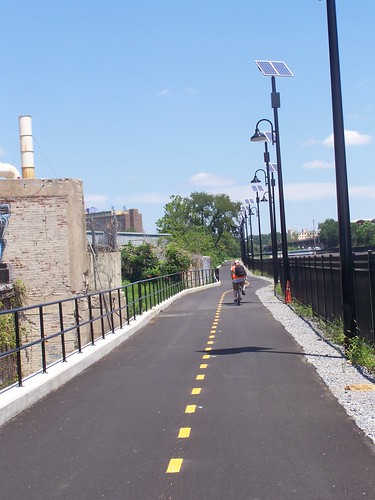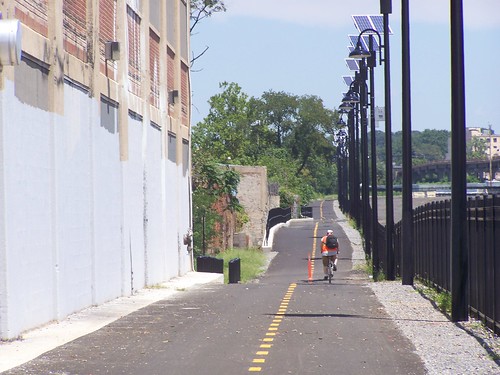Recurring problems on trails because of continued failures to address problems
There were news reports today on NBC4 about the inability of 911.to direct police to a point on the Metropolitan Branch Trail in response to a crime, because there was "no address." This was in response to a recent mugging on the trail (2 teens arrested for robbery of bicyclist on Metropolitan Branch Trail," Fox5).
 In 2007, at a public meeting I said there should be a security plan for the trail. I don't know if even today there is one. There should probably be cameras at access points, and there are not.
In 2007, at a public meeting I said there should be a security plan for the trail. I don't know if even today there is one. There should probably be cameras at access points, and there are not.Years ago, I suggested that the MBT be treated as a street, with block numbers, e.g., between R and S Streets NE should be "the 1700 block of Metropolitan Branch Trail NE."
For example the access point on the west side of Rhode Island Avenue from the shopping center would be approximately the "2300 block of Metropolitan Branch Trail NE."
Treating MBT as the equivalent of a street would be more useful than the "mile markers" touted in the story on NBC4, because mile markers on a trail don't correspond to how the street network is organized and the way that the trail and access points (such as at L, M, N, New York Avenue, R, S, T, etc.) intersect.
(Note that in the entry below I suggested mile markers too, but as indicated, I no longer think that's the right direction.)
-----------
Frustration #1: every year at the start of Spring, crime upticks on trails. Why aren't police proactive about it? (June 17, 2013)
If you were to review news reporting about trails (shared use paths, used by bicyclists and pedestrians) in the DC area over the course of a year, for multiple years, you would see an increase in crimes reported every Spring.
So that's why recent crimes on the Metropolitan Branch Trail in DC ("'Violence for violence's sake is troubling,' says cyclist attacked by up to 15 youths" from the Post), Flawed Metropolitan Branch Trail Cameras Not Doing Much to Fight Crime," Washington City Paper, in Virginia ("Police investigate trail attacks in Fairfax, Arlington" from the Post), and Maryland don't surprise me.
 What bugs me is (1) generally, local jurisdictions don't have security management plans for trails and (2) they don't increase patrols at the onset of Spring, to reduce the likelihood of crime.
What bugs me is (1) generally, local jurisdictions don't have security management plans for trails and (2) they don't increase patrols at the onset of Spring, to reduce the likelihood of crime.The whole point about "problem-oriented policing" is to use data on crime patterns as a tool for interdicting/reducing crime.
This should be an issue for local police departments as well as the parks and/or transportation departments that manage trails.
And it is in Howard County/Columbia, Maryland, according to this ABC News story, "Horse patrols, police to keep paths safe." From the article:
With the summer months here, the Howard County Police Department and Columbia Association are partnering to keep Columbia's 93.5 miles of pathways safe while people are enjoying the outdoors.Why is it that the Howard County Police Department understands, but that DC area police, parks, and transportation departments do not?
While police have not seen an increase in crime in these areas, these efforts are intended to increase police visibility and deter problems.
People using the pathways will have a new resource in an emergency to direct help to their exact location. The police department and Columbia Association, along with recreation and parks, have labeled all bridges on trails in the county to speed up emergency response.
New signs have been placed throughout the trail system with alphanumeric codes. When a caller connects to a 911 dispatcher in an emergency and provides a code, the dispatcher will see a marker on a computer map of that sign's location.
Besides the fact that this an annually recurring problem, with regard to the recurring problems with DC's Metropolitan Branch Trail is that the problems [and solutions] have been identified for a long time.
Labels: bicycling, policing, public safety, transportation planning



5 Comments:
Excellent post... DDOT needs to hire you in some capacity.
I applied to do bike and ped stuff in PGC. HR said I didn't have enough experience...
HR people are generally the stupidest lot in any organization. They operate inside of a narrow box and can't think much outside of it. That said, municipal planners ( I am one) are much the same. Interviews with career muni planners who have no other career experience (when you can land an interview at all) are infuriating because they are stuck in their box as well
this comes up in a project I am working on now--why I haven't been writing--which may at some point be "publicly disclosed" within this blog and more importantly, elsewhere.
The course of action the city took on this plot of land leaves me incredulous. I keep saying/thinking, after the first walkthrough this particular direction should have been obvious, etc.
But in talking about it, I said, 8 years ago, when I dealt a lot with the city's ec. dev. planners, I thought they were good. But in more recent interactions, I've come to believe that while every month since 8 years ago, I've continued to grow and learn, they've stagnated, and have about the same level of knowledge they did back then.
It's really sad, and contributes to a lot of missed opportunities and even a destruction of economic value.
(OTOH, they can be pretty constrained by the priorities of the elected officials.)
This is a helpful post, this post shares information about continued failures to address problems.
But I think that Profoundly active individuals are the ones who have fizzled the most.
Post a Comment
<< Home